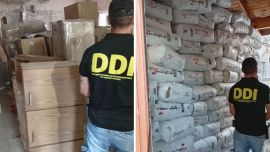UNIVERSITY MARCH
Wednesday’s federal university march was massive enough although not as numerous or spontaneous as its April predecessor (between a quarter and half million around Congress rather than almost a million) with both trade unionists and political activists thicker on the ground. President Javier Milei, who dismissed the march as a “political action” ratified his intention of vetoing the Congress bill to uphold university spending. The moderate and Kirchnerite opposition responded to the veto by calling a special Congress session for next Wednesday to overturn it. In order to do so, they would need a two-thirds majority which they would seem to have.
SINGLE BALLOT NEXT YEAR
The Chamber of Deputies last Tuesday approved the single paper ballot system for national voting in next year’s midterms by a 143-87 vote. The initiative enjoyed multi-party support with the Kirchnerite/Peronist Unión por la Patria coalition supplying the 87 nays and the five Frente de Izquierda leftist deputies abstaining. The bill had already been approved by the lower house in mid-2022 but the Senate had introduced amendments and the previous Alberto Fernández administration opposed to any changes in the electoral system had stalled.
MARIO THE SECOND
As from last Monday, Argentina’s Health minister officially changed surname when Mario Lugones replaced Mario Russo via Decrees 856 and 857 published in the Official Gazette with the first decree accepting the latter’s resignation for “personal reasons” (already submitted on September 26) while the second decree formalised the former’s appointment, justifying it with “his extensive experience in the health area in running Sanatorio Güemes hospital, teaching medicine and clinical research.” That experience went to work the day after Lugones was sworn in on Tuesday, firing the entire administrative board of the prestigious Garrahan Children’s Hospital for granting a 500,000-peso pay bonus and thus flouting government wage deadlines. Lugones is the father of Rodrigo Lugones, a former consultancy partner of star spin doctor Santiago Caputo now living in Spain. Russo, who had been criticised for his handling of the dengue outbreak, is the third Cabinet exit in little more than nine months of the Javier Milei administration after Guillermo Ferraro from the now dissolved Infrastructure Ministry and the first Cabinet chief Nicolás Posse, among some 40 senior officials. A Health Ministry had not been included in Milei’s original Cabinet with the area falling under the umbrella of Sandra Pettovello’s Human Capital Ministry.
BUKELE CALLING
On the penultimate day of a six-day stay here (with his movements in the first four days shrouded in mystery), El Salvador’s President Nayib Bukele finally broke surface last Monday afternoon for a two-hour meeting with President Javier Milei, comparing notes on fiscal austerity, security problems and rule by veto. A notorious law and order hardliner, Bukele visited Congress on his last day here, informing them that there was no comparison between the security problems facing El Salvador and Argentina.
UPS AND DOWNS
The start of October last Tuesday saw various public service costs go up with the sharpest updating for rents but fuels and gas went down in price. Subway tokens rose 16.5 percent from 650 to 757 pesos while electricity was billed an extra three percent. School fees also went up (three percent in the Capital and 4.5 percent in Buenos Aires Province) with water costing 4.9 percent more while most prepaid health schemes increased their charges by a similar percentage although some more. Rents soared 237.5 percent from their previous hike a year ago. But on Monday YPF CEO Horacio Marín announced that his company would be lowering the price of petrol by one percent and of diesel by two percent this month due to falling world prices with Shell rapidly following suit.
MORE CLOSURES
The Mint, the Trenes Argentinos Capital Humano (DECAHF) department of the railways (employing 1,100 and 1,388 people respectively), the Argentine Institute of Transport and the National Museum of Suits are all targets of government austerity, presidential spokesman Manuel Adorni revealed last week in his daily press conferences. The Mint will be restructured now that “money is no longer printed to finance politics,” said Adorni without giving further details. Adorni complained that the DECAHF had nothing to do with running trains (being dedicated to the artistic upgrading of railways and the preservation of their historical heritage) while costing 42 billion pesos annually with even a gender quota. The complaint about the garment museum (founded in 1972) was that it cost 66 million pesos a year while receiving less than 50 visitors a day to admire over 9.300 exhibits dating back to the 18th century.
HOLA SUSANA!
Confirming a trip to China early next year, President Javier Milei defined the economic superpower as a “very interesting” trade partner because “they ask for nothing” in a high-profile interview with Susana Giménez broadcast last Sunday, also gloating that his United Nations General Assembly speech made global progressives “uncomfortable” by “not accepting the socialist agenda of … a United Nations departing from its foundational principles in bidding to construct a supranational government.” Milei brushed aside the 52.9 percent poverty announced on the day of the interview by saying: “Poverty is neither created nor eliminated in one day,” also arguing that the percentage would have been 95 if his government had not staved off the potential hyperinflation it inherited. The President further praised his pet spin doctor Santiago Caputo as a “superlative genius” whose idea it was “to start a presidential campaign.” On the day of the pre-recorded interview (September 26) Milei briefly took his locally famous interviewer out on the balcony of the Casa Rosada to show her off.
NEW COAL TRUSTEE
Pablo Gordillo Arriagada is the new trustee of YCRT (Yacimiento Carboníferos Río Turbio) coal mine in Santa Cruz Province, as confirmed by Decree 869/2024 published last Tuesday in the Official Gazette and signed by President Javier Milei and Economy Minister Luis Caputo. A lawyer with a past in the Kirchnerite politics of the Patagonian province (including being a 2019 Frente de Todos mayoral candidate in Caleta Olivia), the new trustee is widely seen as “imposed” by provincial governor Claudio Vidal, who “consults him on all issues related to energy.” The post fell vacant when the previous trustee Thierry Decoud, linked to centre-right PRO, was fired on September 23 on suspicion of fishing for bribes from the Israeli company TEGI Limited.
MORE INFORMAL EMPLOYMENT
Informal employment has edged up from 35.6 to 36.4 percent of the workforce between the first and second quarters of this year, a report by the Economics Faculty of UBA Buenos University has revealed. Some 70 percent of these workers live below the poverty line as against around 30 percent of the formally employed. There is also a gender slant with 37.2 percent of females informally employed as against 34.2 percent among males although the latter are still the majority (52 percent) since they comprise 54 percent of the workforce. Like poverty, irregular employment is far more acute among the young at almost 58 percent with young women closer to 60 percent. Northern provinces have the most informal employment at almost 44 percent. There are huge variations between job areas, ranging from 76 percent for domestic help and 70 percent for construction to 24.5 percent for financial services and 9.4 percent for the public sector.
JOURNALIST THREATENED
Página/12 journalist and former Buenos Aires Herald and Buenos Aires Times staffer Luciana Bertoia last Monday received a message from the X account of “MuertosVivos,” former military officers imprisoned for crimes against humanity in Campo de Mayo army base which, while ironically expressing an interest in a “productive and dispassionate conversation,” could be construed as intimidation by implying that they knew where to find her. Bertoia replied: “I accept if you can supply information on what you did with the missing and the snatched babies,” obtaining no answers there but various expressions of solidarity from colleagues, politicians and human rights activists.


















Comments